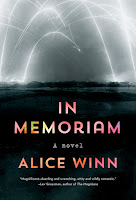Book Review: In Memoriam by Alice Winn

The story opens in 1914 in a residential public school in the English countryside. WWI rages on and many have their schoolmates and family members in service. The young students eagerly and impatiently wait to get their hands on the most recent issue of their school newspaper, The Preshutian, to peruse the lists of names of past students who have lost their lives or have been wounded on the front. Among the present students are Sidney Ellwood and Henry (Heinrich) Gaunt, who harbor feelings for one another but are unable to express the same. Henry is half-German and a pacifist but feels compelled to enlist for the sake of his family and to prove his loyalty to England. Being handed a white feather (meant to symbolize cowardice) in public by a young lady, despite his not being nineteen which was then the minimum age to enlist, prompts him to enlist as soon as becomes eligible. Ellwood, of Jewish descent, is a “poet” at heart but also signs up as soon as he is of age as do many of their classmates. The narrative follows Henry and Ellwood through WWI and its aftermath as they brave the violence and horrors of war, all the while navigating through their feelings for one another.
In Memoriam by Alice Winn transports us to the trenches of the Great War as we follow those young men who bravely served their country, putting their hopes and dreams on hold in the interest of the greater good. The narrative is non-linear but not difficult to follow. Interspersed throughout the narrative are correspondence between Ellwood and Gaunt and pages from The Preshutian, with the lists of those wounded, missing and those who were killed in action, with a poignant “In Memoriam” section comprising the obituaries of alumni who have lost their lives on the front. Lord Tennyson’s work is referenced multiple times throughout the narrative (the title of the book is taken from “In Memoriam A.H.H.)” with The Charge of the Light Brigade of particular significance. In describing the war effort, the author also alludes to social class distinction among the officers and references imperialist Britain and how colonization contributed to diversity within the ranks.
“We told those Algerians that their civilisation was no good, that they must have ours instead, we carried our white man’s burden dutifully, enlightening Indians—Indians! They who built the Taj Mahal! And Egyptians! For we knew better than their pyramids! We swarmed through Africa and America because we were better than they, of course we were, we were making war humane, and now it has broken down and they are dragged into hell with us.”
We meet several characters in the course of Henry and Ellwood’s journey, some for a longer duration than others, but each of them are important in how they are impacted what they experience. Not everyone will survive the war and for those who return, what they have experienced and witnessed will leave an indelible imprint on their lives. The author is unflinching in her depiction of both the the physical and emotional trauma that these young soldiers endure and how these experiences impact their perceptions of country and honor as well as their personal relationships and general worldview.
Author Alice Winn pays great attention to detail. The scenes from the trenches of Loos and Somme are vividly descriptive and heartbreaking but exquisitely written. This is a tender love story - a story of bravery and sacrifice - and also a coming-of-age tale wherein the author captures the camaraderie and the competitiveness among school friends and the innocence and hopefulness of boyhood beautifully and how a generation of young men (some as young as fifteen) were led to experience the harsh reality of a country at war, exposing them to horrors they could have never imagined. There are a few melodramatic moments but this does not detract from the overall reading experience.
“I actually believed that the principles of our civilisation, our civilisation that has developed further than any other in the history of the world, giving us telephones and trains and flying, for God’s sake, we can fly, I thought, surely such a civilisation, that prides itself on conquering the beast in man and seeks only to bend towards beauty and prosperity, surely, surely, surely, it would not shatter in such a vile and disgusting way. The Hague Convention sought to make war more humane. We had reached a point in history where we believed it was possible to make war humane. “
Please read the Author’s Note where she discusses the historical context and the people, places and true events that inspired this novel.
This is certainly one of the most compelling debut novels I have read this year. I can’t wait to read more from this talented new author.
Comments
Post a Comment